Hyundai i20 vs Toyota Aygo – erot ja hinnat vertailussa
Vertaa tehoa (90 hv vs 72 hv), tavaratilaa ja hintaa (22600 € vs 18900 € ) yhdellä silmäyksellä. Kumpi auto on sinulle parempi valinta, Hyundai i20 vai Toyota Aygo?
Kustannukset ja kulutus
Taloudellisuudessa on mielenkiintoisia eroja näiden kahden mallin välillä.
Toyota Aygo on hinnassa jonkin verran edullisempi – sen lähtöhinta on 18900 € , kun taas Hyundai i20 maksaa 22600 € . Ero on noin 3761 €.
Myös polttoaineenkulutuksessa näkyy ero: Toyota Aygo kuluttaa 4.80 L ja on siten pienessä määrin taloudellisempi kuin Hyundai i20, jonka kulutus on 5.70 L. Ero on noin 0.90 L /100 km.
Moottori ja suorituskyky
Moottorin alta paljastuu, kumpi malli on urheilullisempi ja kiihtyy paremmin.
Moottoritehossa Hyundai i20 on vähän etulyöntiasemassa – 90 hv verrattuna 72 hv:een. Ero on noin 18 hv hv.
Kiihdytyksessä 0–100 km/h Hyundai i20 on selvästi havaittava nopeampi – se saavuttaa 100 km/h ajassa 11.50 s, kun taas Toyota Aygo tarvitsee 15.50 s. Ero on noin 4 s sekuntia.
Myös vääntömomentissa näkyy ero: Hyundai i20 vetää merkittävä voimakkaammin, 172 Nm verrattuna 93 Nm:een. Eroa on noin 79 Nm.
Tila ja käytännöllisyys
Tehon ohella arjessa ratkaisevat mukavuus ja käytännöllisyys. Tässä selviää, kumpi auto on monipuolisempi ja tilavampi.
Istuimet: Hyundai i20 tarjoaa pienessä määrin enemmän istumapaikkoja – 5 vs. 4.
Omapainossa Toyota Aygo on vähän kevyempi – 1015 kg verrattuna 1145 kg:een. Painoero on noin 130 kg.
Tavaratilan koossa Hyundai i20 tarjoaa erottuva enemmän – 352 L verrattuna 231 L:een. Ero on noin 121 L.
Kantavuudessa Hyundai i20 on selvästi havaittava parempi – 465 kg verrattuna 345 kg:een. Ero on noin 120 kg.
Kuka vie voiton?
Kokonaisuudessaan Hyundai i20 on voittaa vertailun selvästi ja nappaa näin DriveDuel Champion -tittelin.
Se vakuuttaa tasapainoisemmalla kokonaisuudellaan ja on käytännöllisempi kumppani arjessa.

Hyundai i20
Kustannukset ja kulutus
Näytä yksityiskohtainen analyysi
Moottori ja suorituskyky
Näytä yksityiskohtainen analyysi
Mitat ja kori
Näytä yksityiskohtainen analyysi
Hyundai i20
Hyundai i20 on fiksusti muotoiltu pikkukaupunkilainen, joka tuntuu huomattavasti viitseliäämmältä ajokumppanilta kuin sen kokoluokka antaa odottaa. Se sopii mainiosti arkeen: käytännöllinen, mukava ja helppo valinta niille, jotka haluavat yksinkertaista luotettavuutta ilman turhaa kikkailua.
Tiedot




Toyota Aygo
Toyota Aygo on pirteä ja ketterä kaupunkiauto, joka soljuu ruuhkassa vaivattomasti ja löytää paikan lähes jokaiseen parkkiruutuun. Se tarjoaa mutkattoman ja edullisen tavan liikkua kaupungissa — sopii mainiosti ostajalle, joka haluaa käytännöllisyyttä ilman turhaa prameilua.
Tiedot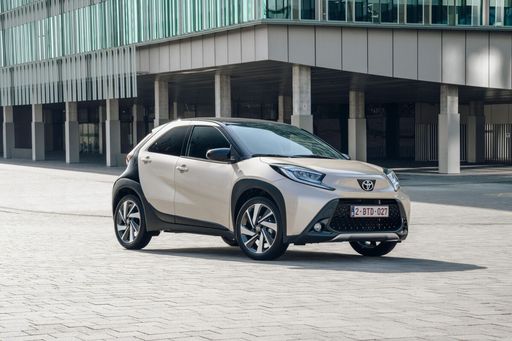
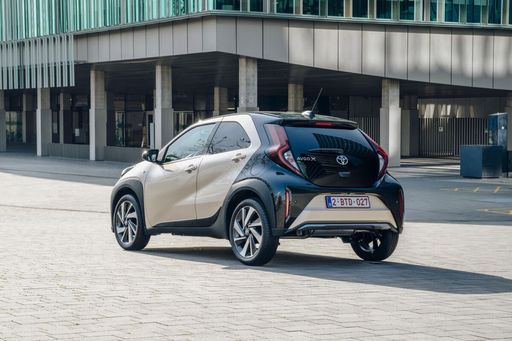
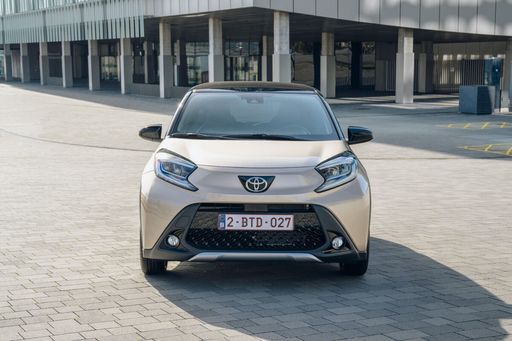
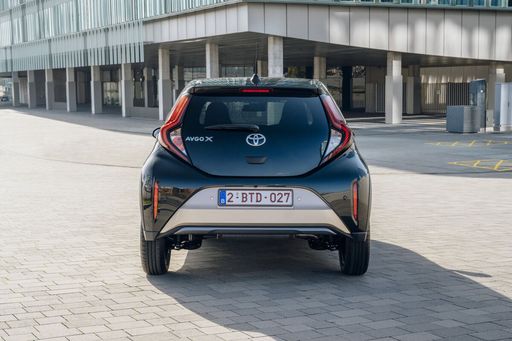
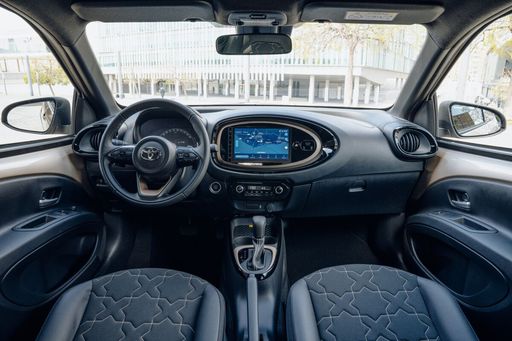
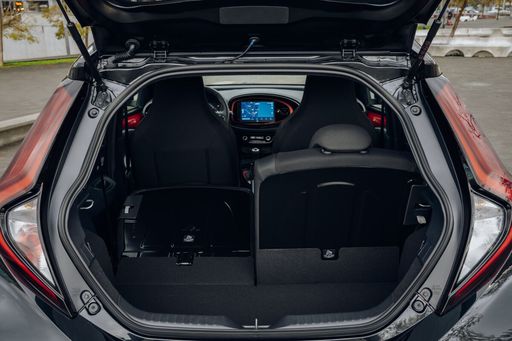
Kustannukset ja kulutus |
|
|---|---|
|
Hinta
22600 - 29200 €
|
Hinta
18900 - 26900 €
|
|
Kulutus L/100km
5.70 L
|
Kulutus L/100km
4.8 - 4.9 L
|
|
Kulutus kWh/100km
-
|
Kulutus kWh/100km
-
|
|
Sähköinen toimintasäde
-
|
Sähköinen toimintasäde
-
|
|
Akun kapasiteetti
-
|
Akun kapasiteetti
-
|
|
CO2
128 - 129 g/km
|
CO2
108 - 111 g/km
|
|
Polttoainesäiliön tilavuus
-
|
Polttoainesäiliön tilavuus
35 L
|
Mitat ja kori |
|
|---|---|
|
Kori
Viistoperä
|
Kori
SUV
|
|
Istuimet
5
|
Istuimet
4
|
|
Ovet
-
|
Ovet
5
|
|
Omamassa
1145 - 1170 kg
|
Omamassa
1015 kg
|
|
Tavaratila
352 L
|
Tavaratila
231 L
|
|
Pituus
-
|
Pituus
3700 mm
|
|
Leveys
1775 mm
|
Leveys
1740 mm
|
|
Korkeus
-
|
Korkeus
1510 mm
|
|
Maksimi tavaratila
-
|
Maksimi tavaratila
829 L
|
|
Kantavuus
455 - 465 kg
|
Kantavuus
345 kg
|
Moottori ja suorituskyky |
|
|---|---|
|
Moottorityyppi
Bensiini
|
Moottorityyppi
Bensiini
|
|
Vaihteisto
Manuel, Automaatti
|
Vaihteisto
Manuel, Automaatti
|
|
Vaihteiston lisätiedot
Manuaalivaihteisto, Kaksoiskytkin automaatti
|
Vaihteiston lisätiedot
Manuaalivaihteisto, CVT-vaihteisto
|
|
Vetotapa
Etuveto
|
Vetotapa
Etuveto
|
|
Teho hv
90 hv
|
Teho hv
72 hv
|
|
Kiihtyvyys 0-100 km/h
11.5 - 12.8 s
|
Kiihtyvyys 0-100 km/h
15.5 - 15.6 s
|
|
Huippunopeus
-
|
Huippunopeus
151 - 158 km/h
|
|
Vääntömomentti
172 Nm
|
Vääntömomentti
93 Nm
|
|
Sylinterien lukumäärä
3
|
Sylinterien lukumäärä
3
|
|
Teho kW
66 kW
|
Teho kW
53 kW
|
|
Iskutilavuus
998 cm3
|
Iskutilavuus
998 cm3
|
Yleistä |
|
|---|---|
|
Mallivuosi
2025
|
Mallivuosi
2024 - 2025
|
|
CO2-tehokkuusluokka
D
|
CO2-tehokkuusluokka
C
|
|
Merkki
Hyundai
|
Merkki
Toyota
|
Mitä vetotapavaihtoehtoja Hyundai i20 tarjoaa?
Mallia tarjotaan Etuveto-versiona.
